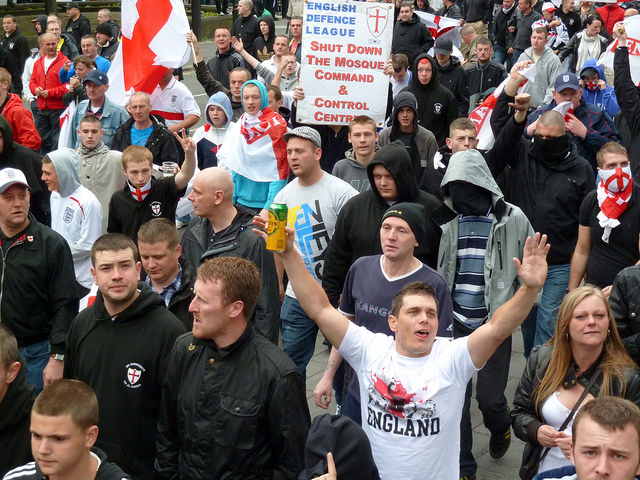
Far-right group the English Defence League march (Photo: Gavin Lynn/Flickr/Creative Commons)
It is probably a sign of the success of our society that people like me spend so much of our time defending the rights of jerks.
Racists, misogynists, Christian fundamentalists, jihadists, wannabe jihadists, counter-jihadists, homophobes, trolls, Top Gear presenters, True Torah Jews, Nazis; cretins of all colours and creeds. In modern, liberal Europe, these are the people who tend to get in trouble over free speech. In the past, they were the ones in charge.
That is not to say everyone else is entirely free from censorship; and of course, the reason we defend free expression as a good in itself is because we understand that the powers used to silence the craven can also be used to silence the virtuous, but by and large, it’s the oddballs who tend to get into trouble. Them and journalists.
And so we turn our attention, wearily but determinedly, to the case of the “anti-Jewification” protest which was due to take place in London’s Golders Green on 4 July. As others have pointed out, anyone hoping to prevent the “Jewification” of Golders Green is, frankly, a bit late. But then, we know full well that Judenfrei policies have experienced some success in the past.
The stationary protest will now not take place in Golders Green, but instead in central London – Whitehall to be precise, away from Golders Green’s Jewish community. Ironically, many Jews are now planning to make their way to Westminster to stage a counter-demonstration.
As Richard Ferrer, editor of Jewish News, noted: “Saturday’s rally is fast turning into the social event of the season for the capital’s Jewish community. When it was originally announced, synagogues braced themselves for their lowest Shabbat attendance figures in years. I had a family lunch booked, but had to make sure it didn’t clash with the scheduled Holocaust denial and book burning.”
It does all sound rather fun, but the moving of the Nazi demonstration does raise questions about the nature of protest and how it is policed.
A demonstration must be disruptive, by its very nature. So there’s a dilemma raised by the moving of a protest from the scene of its target, in this case the Jewish community, does it become effectively meaningless? What happens if a swastika waves in a side street in Whitehall, with no one there to fear it? Does it still resound?
The police decision to move the demonstration, in spite of earlier claims that they were powerless to do so, has effectively neutered it. It’s meaningless.
Now here’s the question: should the police have a right to neuter protest in that manner? Or does the fact that the neo-Nazis are allowed stand in the street and make their little speeches, even if it’s not the street they wanted to stand in, mean that their free speech has been fully protected? I’m not entirely sure we’ve thought about this fully. But I do recall past campaigns against “designated protest zones”, for example during the Beijing Olympics in 2008.
I don’t really know what the answer is here: I guess the simple point is that one should be free to protest outside institutions but not outside people’s homes. But then what about the UK Uncut protesters who staged a “street party” outside then-Deputy Prime Minister Nick Clegg’s home?
This case of the relocated anti-Semites is interesting exactly because it has not turned out to be Britain’s Skokie case. To briefly recap, Skokie was an Illinois town where many Holocaust survivors had settled.
In 1977, the National Socialist Party of America proposed a march there. They were opposed. The case eventually ended up in the Supreme Court. The ACLU backed the Nazis’ right to march. Eventually, the court upheld the Nazis’ right to march. But they never actually did. [For more on this case, read Index on Censorship magazine, Vol 37, Number 3, 2008].
In 2015 in north London we have a similar but different case. There are some Nazis wanting to march in a Jewish neighbourhood, there are some people who object. But there is no great call to principle, no great desire to take up the cause seemingly on either side. It’s hard to even get anyone on the Nazi side to own up to who exactly is in charge. Joshua Bonehill, the Somerset Stormtrooper and all round troll, is widely believed to be responsible. He was arrested early this week on suspicion of incitement to racial hatred. No one seemed that bothered.
This is the British way of free expression; a matter of practicality rather than principle, a pliable concept, one that can almost always be tempered by appeals to taste: it is simply distasteful for Nazis to demonstrate in Golders Green; just not done to burn a poppy.
By and large, taste wins out in these compromises. Remember that the Chatterley ban only came to an end because it was deemed that the book was of high enough literary quality, not because adults have the right to read what they damned well please.
Tastefulness being the characteristic the British most pride themselves upon means it’s rare that anyone will argue against it. It’s a soft tyranny most people seem happy to live with.
This article was posted on 2 July 2015 at indexoncensorship.org




